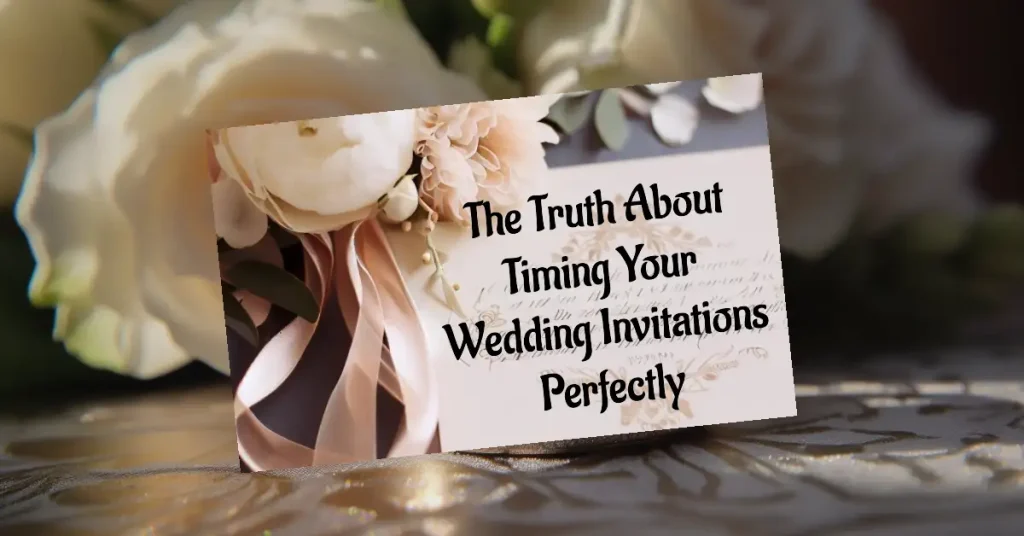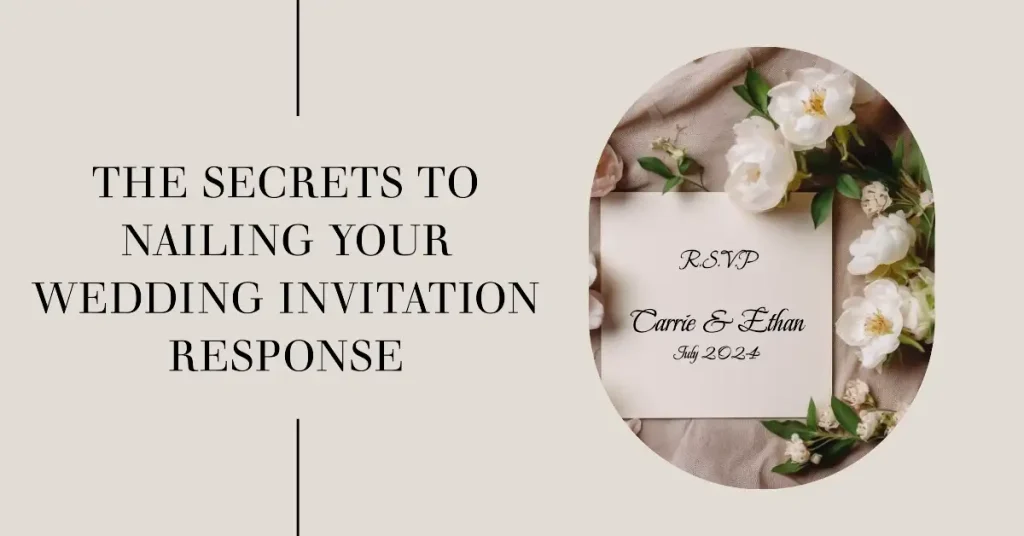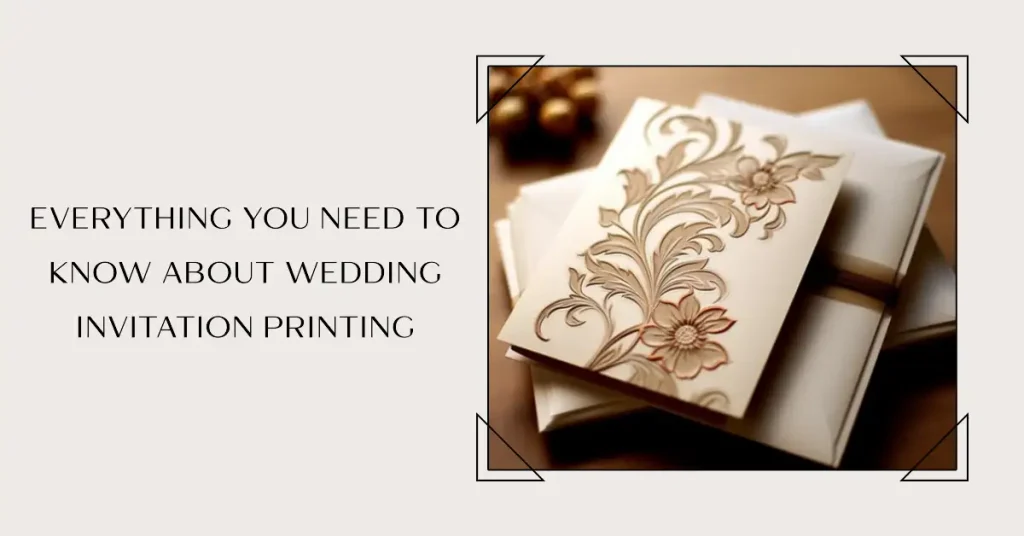Table of Contents
To decline a wedding invite gracefully and respectfully, it’s important to respond promptly and politely. You can write a personal note or message expressing your gratitude for the invitation and explaining briefly and honestly why you cannot attend, ensuring to convey your best wishes for the couple’s special day. Avoid over-explaining or giving unnecessary details, as a simple and sincere response is often most appreciated.
We’ll discuss this topic in more detail in the paragraphs below…
Wedding invitations are a special way to invite friends and family to share in the joy of two people getting married. While it’s an honor to be invited, sometimes it’s not possible to attend. Declining a wedding invitation can be a challenging and sensitive situation. It’s therefore important to know how to decline a wedding invite with grace and respect to maintain relationships and not hurt feelings.
- Carter, Lisa (Author)
- English (Publication Language)
- 107 Pages - 04/06/2024 (Publication Date) - Independently published (Publisher)
While it’s okay to decline an invitation, it’s vital to approach the situation tactfully. This article will provide valuable tips and examples on how to politely decline a wedding invitation and maintain strong relationships with the couple and their family.
Reasons for Declining a Wedding Invitation
While it’s natural to want to share in a couple’s joy on their wedding day, sometimes it’s just not feasible. Here are some common reasons why someone might decline a wedding invitation:
- Scheduling conflicts: If the wedding date conflicts with other important commitments, such as a work or family event, it’s important to prioritize those obligations.
- Financial constraints: Weddings can be expensive, and attending one may not be feasible for everyone. Travel expenses, lodging, and even a wedding gift may be beyond one’s means.
- Personal obligations: Sometimes personal circumstances, such as illness or caregiving responsibilities, make it difficult to attend a wedding. It’s important to prioritize one’s own well-being and responsibilities.
- Uncomfortable situations: If there are personal reasons why attending the wedding would be uncomfortable or emotionally taxing, it’s important to respect one’s own boundaries and decline the invitation.
It’s important to remember that declining a wedding invitation is a personal decision and the couple should understand and respect your decision. It’s always better to decline an invitation than to attend begrudgingly and have a negative impact on the couple’s special day.
Etiquette for Declining a Wedding Invitation
Declining a wedding invitation is a personal decision that requires tact and respect. Responding promptly is key as it allows the couple to adjust their plans accordingly, and not responding at all might leave them uncertain about your attendance or absence. To communicate your decision gracefully and respectfully, follow these etiquette guidelines:
- Offer your apologies: Express regret for not being able to attend the wedding. A sincere apology can help mitigate any potential misunderstandings or hurt feelings.
- Be truthful and concise: Provide a brief but honest explanation for your absence, such as a scheduling conflict or budgetary constraints. Avoid going into too much detail or making excuses.
- Show appreciation: Express your appreciation for the invitation and your excitement for the couple’s special day. Keep in mind that it’s important to maintain your relationship with the couple, regardless of your attendance.
- Send an RSVP: Even if you’re declining the invitation, it’s important to send an RSVP as a sign of respect. A physical or digital card can help you communicate your decision clearly and politely.
When declining a wedding invitation, it’s important to use polite and sincere language to convey your regrets while remaining respectful of the couple’s feelings and plans. By following these guidelines, you can gracefully decline a wedding invitation while maintaining your friendship with the couple.

Communicating Your Decision Personally
When declining a wedding invitation, it’s important to communicate your decision personally rather than through a third party. Whether it’s through a face-to-face conversation or a phone call, taking the time to express your regret to the couple shows that you value the relationship.
When communicating your decision, it’s important to do so with sensitivity and understanding. Start the conversation by expressing your gratitude for the invitation and your regret that you won’t be able to attend. If applicable, provide a brief explanation for your inability to attend, such as a scheduling conflict or financial constraints.
It’s also important to listen to the couple’s response and respond with empathy. They may be disappointed or hurt by your decision, and it’s important to acknowledge their feelings and express your support for their special day.
| Do: | Express gratitude for the invitation |
|---|---|
| Provide a brief explanation, if applicable | |
| Listen to the couple’s response and respond with empathy | |
| Don’t: | Make excuses or downplay the importance of the wedding |
| Be insincere or dismissive |
Remember that your decision to decline a wedding invitation is personal and valid. It’s important to communicate your decision respectfully and honestly while maintaining the relationship with the couple. By taking the time to communicate your regret personally, you can show your respect for the couple and maintain your friendship.
Offering Congratulations and Well Wishes
Despite declining a wedding invitation, expressing congratulations and well wishes to the couple is still important to maintain the friendship. A thoughtful and genuine message can show your support and make the couple feel appreciated.
Here are some tips for offering congratulations and well wishes:
- Send a heartfelt card or message.
- Offer to take the couple out for a celebratory dinner or brunch.
- Send a thoughtful gift that shows you were thinking of them on their special day.
- Suggest alternative ways to celebrate their love, such as a post-wedding gathering or a special trip.
Remember, the goal is to show your support and love for the couple even if you cannot attend their wedding. A thoughtful message or gesture can go a long way in maintaining a strong relationship.
Alternative Ways to Show Your Support
While declining a wedding invitation may seem like the end of your involvement in the couple’s special day, there are still many ways to show your support and maintain your relationship.
One option is to send a thoughtful gift or card congratulating the couple on their marriage. This gesture can show that you are still invested in their relationship and want to share in their joy. Consider sending a personalized or handmade gift to add a special touch.

If you want to celebrate with the couple, but cannot attend the wedding, you can organize a separate celebratory gathering. This can be a dinner party, brunch, or even a weekend getaway. Be sure to coordinate with the couple to ensure the event does not conflict with their wedding plans.
If you have a specific skill or talent that could be helpful in wedding preparations, offer your assistance. This could be anything from helping with decorations to providing transportation for out-of-town guests. Your offer to help will be appreciated and can strengthen your relationship with the couple.
Remember, the key is to make an effort to stay connected and supportive despite not attending the wedding. Your sincere interest in their marriage will be remembered and appreciated.
Dealing with Potential Guilt or Pressure
It’s common to feel guilty or pressured when declining a wedding invitation. However, it’s essential to remember that it’s your personal decision, and it’s okay to decline an invitation for whatever reason. If you feel guilty, remember that your absence does not diminish your friendship or love for the couple.
If you face pressure from the couple or others to attend the wedding, try to communicate openly and honestly. Explain your reasons for declining the invitation and express regret for not being able to attend. Emphasize that your decision is based on personal circumstances and that it does not reflect any negative feelings towards the couple or their relationship.
It’s crucial to avoid making false promises, such as saying you’ll attend and then not showing up. This will only hurt the couple and damage your relationship with them. Instead, be sincere and respectful in your communication, and try to find alternative ways to show your support and love for the couple.
“It’s your personal decision, and it’s okay to decline an invitation for whatever reason”
Handling Follow-up Questions or Invitations
After declining a wedding invitation, it’s possible that the couple may follow up with questions or even send subsequent invitations to other events related to the wedding. It’s important to handle these situations with the same grace and respect as declining the initial invitation.
If the couple asks for specific reasons why the invitation was declined, it’s acceptable to provide a brief explanation without going into too much detail. Keep in mind that the couple may be sensitive to the reasons given and may not want to feel like they are being judged or criticized.
If the couple extends another invitation, such as an invitation to the bridal shower or rehearsal dinner, it’s important to thank them for the invitation and politely decline if necessary. Remember that declining an invitation does not mean declining the relationship, and there are other ways to show support and celebrate the couple’s special day.
It’s also important to communicate any decisions or updates in a timely manner, whether that means confirming attendance to a separate event or declining another invitation. Being transparent and honest with the couple can help avoid any misunderstandings or hurt feelings.
Overall, handling follow-up questions or invitations is a continuation of the initial decision to decline the wedding invitation gracefully and respectfully. By maintaining open communication and expressing genuine congratulations and well wishes, the couple will understand and respect the decision.
Conclusion
Declining a wedding invitation is a personal decision that requires tact and sensitivity. By following the proper etiquette and communicating your decision personally, you can maintain respect and kindness while also prioritizing your own needs. Remember to offer congratulations and well wishes to the couple and consider alternative ways to show your support. If you experience feelings of guilt or pressure, it is important to manage these emotions and stay true to your own priorities. As you navigate this delicate situation, remember that a thoughtful and gracious approach can help maintain your relationships and create positive experiences for all involved.







